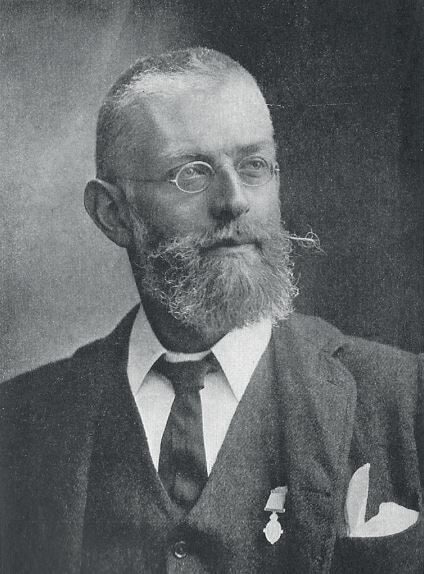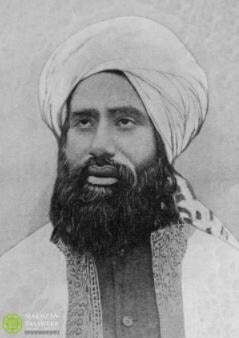A series looking at the high standard of morals of the Promised Messiahas and his Khulafa when receiving visitors in Qadian
Tahmeed Ahmad, Ahmadiyya Archive and Research Centre
Theodore Leighton Pennell was born in 1867 and passed away on 23 December 1912. He was a doctor and an English Protestant missionary who spent some time living among the tribes of Afghanistan.

Pennell joined the Church Missionary Society in 1890, arriving in India by 1892. He began learning Punjabi in 1901, making him proficient in three Indian languages including Urdu and Pashtun. He eventually travelled through Punjab by bicycle in 1904. It was during this trip that TL Pennell visited Qadian, an account of which he published in his book, Among the Wild Tribes of the Afghan Frontier.
He stayed in foreign lands for 16 years, leaving for England in 1908. On his return to India, he married Alice Sorabji who was the first woman in India to earn a bachelor’s of science degree.
Pennell founded the Pennell High School and a missionary hospital in Bannu in the North-West Frontier of British India, now Pakistan. For his work, he received the Kaisar-i-Hind Medal for public service in India.
On many occasions, the Promised Messiahas received the revelation from Allah Almighty that people from all over the world would come to Qadian.
In March 1882, the Promised Messiahas received the following revelation:
يَاْتِيْكَ مِنْ كُلِّ فَجٍّ عَمِيْقٍ۔ يَاْتُوْنَ مِنْ كُلِّ فَجٍّ عَمِيْقٍ۔ يَنْصُرُكَ اللّٰهُ مِنْ عِنْدِهٖ۔ يَنْصُرُكَ رِجَالٌ نُّوْحِيْٓ اِلَيْهِمْ مِّنَ السَّمَٓاءِ لَا مُبَدِّلَ لِكَلِمَاتِ اللّٰهِ۔ اِنَّا فَتَحْنَالَكَ فَتْحًا مُّبِيْنًا۔
“People will come to you so that the track will become deep due to excessive travel. So many people will come to you that the track on which they travel will become deep. Allah will help you from Himself. Such people will help you whom We shall inspire from Ourself. No one can change the words of Allah. We will bestow upon you a manifest victory.” (Tadhkirah [English translation], p. 57)
Two accounts are available of Pennell’s journey to Qadian. The first one, as mentioned above, is from his book, Among the Wild Tribes of the Afghan Frontier. The other is an account written by his wife, Alice Maude Sorabji Pennell, Pennell of the Afghan Frontier: The Life of Theodore Leighton Pennell. The accounts only differ in style of narration, otherwise they are remarkably similar in terms of context.
Presented below is the account of Pennell’s travel to Qadian from his book with some additional notes provided from his wife’s account. (It should be noted that due to being a Christian, Pennell saw Hazrat Ahmad’s claim as the Messiah as something objectionable, something which he voices below):
“Passing over our [Dr Pennell, accompanied by a gentlemen named Jahan Khan] stay here [in India] and at other intervening places, I might mention our visit to Kadian, rendered famous by being the headquarters of the Muhammadan reformer Mirza Ghulam Ahmad, who died in 1908. This man had collected around him a band of zealous followers, but, unfortunately, the good he might have done was nullified by his impious claim to be the returned Messiah, in accordance with which he professed miraculous powers, and demanded a correspondingly abject obedience.
“Heavy rain-clouds were overcasting the sky when we [Dr Pennell and Jahan Khan] set out, and we had scarcely covered the eleven miles of unmade road that connects Batala with Kadian when the downpour commenced, and continued throughout the day. Moulvi Muhammad Sadiq [Hazrat Mufti Muhammad Sadiqra], the head-master of the Mirza’s High School, received us with the greatest courtesy, and gave us one of the schoolrooms to rest in, and shortly afterwards, as the Mirza himself was indisposed and unable to see us, we were taken into the presence of his lieutenant, Moulvi Moha-ud-din [Alice has used the name Maulvi Nur-ud-din which is believed to be correct, and confirmed by Al Hakam on 10 January 1904]. This Moulvi is very learned, probably the most learned in Kadian; he comes from the town of Bhera, in the Panjab, but has travelled a good deal. He was teaching theology to a large class of youths and men in Eastern fashion, reclining on a simple mat and a cushion himself, while his pupils sat on the ground round him. Tea was brought in for us and him while he went on teaching. The Hadis [Hadith] from which the pupils were reading was on the subject of prayer, and the Moulvi explained the passages with great force and perspicuity as the pupils read them out turn by turn. After some dissertation on the correct intonation of prayers, he took up (probably for our benefit) a comparison of the texts of the Quran and the Bible, showing how the custom of committing the former to memory had resulted in its verbal correctness. Following, the same line, Muhammad Sadiq compared with this the recent criticisms on the Bible by the Christian expositors; and the ‘Encyclopaedia Biblica’, which he seemed to have studied minutely, afforded him an inexhaustible store of argument.

“After this the midday meal was brought in, and then we were sent for by a relation of the Nawab of Maler-Kotla, who had become a disciple of the Mirza, and had devoted himself and his resources to his service, and was living in the village in a simple, almost Spartan, manner. After conversation with him and others, I was shown the high school, college classes, and boarding-house. Though the buildings for the latter were second-rate, yet the management seemed good, and the inmates orderly and well-trained. In particular I noticed that, though the next morning was chilly and drizzly, yet all were up at the first streak of dawn, and turned methodically out of their warm beds into the cold yard, and proceeded to the mosque, where all united in morning prayers, after which most of them devoted themselves to reading the Quran for half an hour to one hour. Many of the masters, too, seemed very earnest in their work, and had given up much higher emoluments to work for quite nominal salaries in the cause to which they had devoted themselves.
“We were fairly tired out with a long day of talking and interviewing, and slept soundly. We were disappointed, too, in receiving a message that the Mirza was still too unwell to see us, but would do so in the morning. However, when morning dawned we heard with much regret that he had passed a bad night and was still unable to see anyone. As his attendants were unable to hold out any prospect of a speedy interview, and as, indeed, we felt doubtful whether the interview was desired, we prepared for an early start. We had been kindly and hospitably received, and there was something inspiriting in seeing a number of educated men thoroughly zealous and keen in the active pursuit of religion, though the strong spirit of antagonism to Christianity was saddening.” (Theodore Leighton Pennell, Among the Wild Tribes of the Afghan Frontier, publication 1922, pp. 247-249)
Alice Maude Sorabji Pennell has mentioned in her book, Pennell of the Afghan Frontier: The Life of Theodore Leighton Pennell that on a different occasion, Dr Pennell also met with “Muhammad Ahsan”, a companion of the Promised Messiahas, and whilst working in Bannu, a son of the Promised Messiahas, believed to be Sahibzada Mirza Sultan Ahmad.


Wow